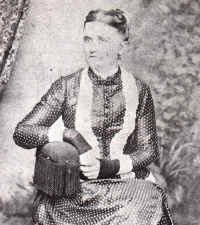Rose
O'Neal Greenhow was born in Montgomery County, Maryland in 1817. "Wild Rose", as
she was called from a young age, was a leader in Washington society, a passionate
secessionist, and one of the most renowned spies in the Civil War. Among her
accomplishments was the secret message she sent to General Pierre G.T. Beauregard which
ultimately caused him to win the battle of Bull Run. She spied so successfully for the
Confederacy that Jefferson Davis credited her with winning the battle of Manassas.
She was imprisoned for her efforts first in her own home and then in the Old Capital
Prison. Despite her confinement, Greenhow continued getting messages to the Confederacy by
means of cryptic notes which traveled in unlikely places such as the inside of a woman's
bun of hair. After her second prison term, she was exiled to the Confederate states where
she was received warmly by President Jefferson Davis.
Her next mission was to tour Britain and France as a propagandist for the Confederate
cause. Two months after her arrival in London, her memoirs were published and enjoyed a
wide sale throughout the British Isles. In Europe, Greenhow found a strong sympathy for
the South, especially among the ruling classes. During the course of her travels she
hobnobbed with many members of the nobility. In Paris, she was received into the court of
Napoleon III and was granted an audience with the Emperor at the Tuileries. Rose's diary
(August 5, 1863 - August 10, 1864), held in the North Carolina
State Archives in Raleigh, NC, describes her mission in great detail.
In 1864, after a year abroad, she boarded the Condor, a British blockade-runner
which was to take her home. Just before reaching her destination, the vessel ran aground
at the mouth of the Cape Fear River near Wilmington, North Carolina. In order to avoid the
Union gunboat that pursued her ship, Rose fled in rowboat, but never made it to shore. Her
little boat capsized and she was dragged down by the weight of the gold she received in
royalties for her book.
In October 1864, Rose was buried with full military honors in the Oakdale Cemetery in
Wilmington. Her coffin was wrapped in the Confederate flag and carried by Confederate
troops. The marker for her grave, a marble cross, bears the epitaph, "Mrs. Rose O'N.
Greenhow, a bearer of dispatchs [sic] to the Confederate Government."
The collection is mostly correspondence with Rose Greenhow related to her activities on
behalf of the Confederate States of America. The bulk of the collection consists of
letters, 1863-1864, from Greenhow to Alexander Robinson Boteler (1815-1892) reporting on
the July 1863 bombardment of Charleston, S.C., interviews with Confederate officers, and
her mission to Europe, including meetings with Napoleon III, Cardinal Wiseman, and Thomas
Carlyle. Also included is an 1860 letter to Francis P. Corbin introducing Bishop Kip. In
this on-line collection, several items contained in other Duke University collections have
been added. These include a lengthy (though incomplete) letter to Jefferson Davis and
several newspaper clipping about Greenhow's imprisonment in 1861 and death in 1864.
 Sarah Lane was born February 11, 1838 in Greene County,
Tennessee. In 1854, Sarah married Sylvanius H.Thompson and they had two children.
Sylvanius later became a private in the 1st Tennessee Calvary U.S.A., where he served
primarily as a recruiter for the Union Army. Sarah worked alongside her husband assembling
and organizing Union sympathizers in a predominately rebel area around Greeneville,
Tennessee. In early 1864, Sylvanius Thompson was ambushed and killed by a Confederate
soldier. Spurred by her husband's death, Sarah Thompson continued her work for the Union,
delivering dispatches and recruiting information to Union officers. When CSA General John
Hunt Morgan and his men spent the night in Greeneville, Sarah managed to slip away and
alert Union forces to his whereabouts. Union troops invaded the area and by her accounts,
she personally pointed out Morgan hiding behind a garden fence to a Union soldier who
proceeded to kill Morgan.
Sarah Lane was born February 11, 1838 in Greene County,
Tennessee. In 1854, Sarah married Sylvanius H.Thompson and they had two children.
Sylvanius later became a private in the 1st Tennessee Calvary U.S.A., where he served
primarily as a recruiter for the Union Army. Sarah worked alongside her husband assembling
and organizing Union sympathizers in a predominately rebel area around Greeneville,
Tennessee. In early 1864, Sylvanius Thompson was ambushed and killed by a Confederate
soldier. Spurred by her husband's death, Sarah Thompson continued her work for the Union,
delivering dispatches and recruiting information to Union officers. When CSA General John
Hunt Morgan and his men spent the night in Greeneville, Sarah managed to slip away and
alert Union forces to his whereabouts. Union troops invaded the area and by her accounts,
she personally pointed out Morgan hiding behind a garden fence to a Union soldier who
proceeded to kill Morgan.
After this event, Sarah served as an army nurse in Knoxville, Tennessee and in
Cleveland, Ohio. She supported herself and her daughters by giving lectures in several
northern cities about her experiences during the war. In 1866 she married Orville J. Bacon
of Broome County, New York and had two children with him. They were subsequently divorced
and she married James Cotton in the 1880s. Cotton died, leaving her once again a single
mother. After the war, Sarah's life was marked by the constant struggle to find suitable
employment to support her family and to claim a pension for her services during the war.
She worked through many temporary appointments in the federal government and eventually
was granted a pension of $12 a month by order of a special act of Congress in 1897. She
died on April 21, 1909 after being struck by an "electric car" in Washington,
D.C., and was buried in the Arlington National Cemetery.

